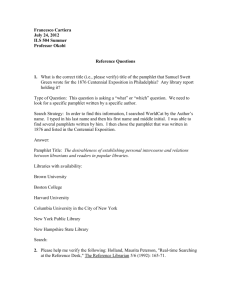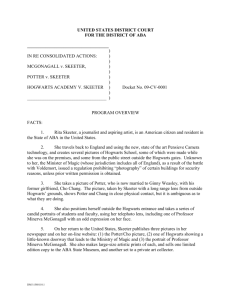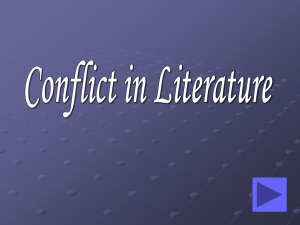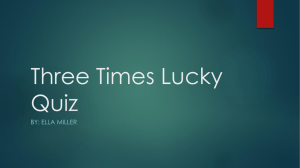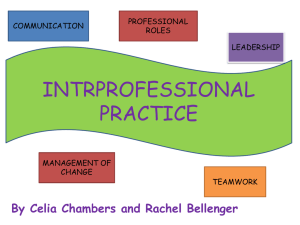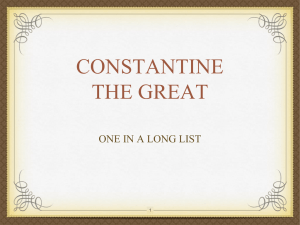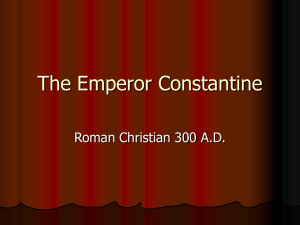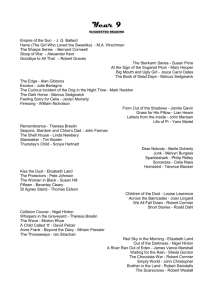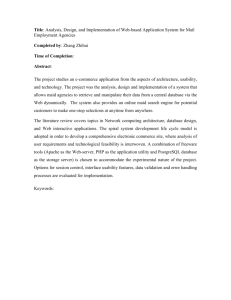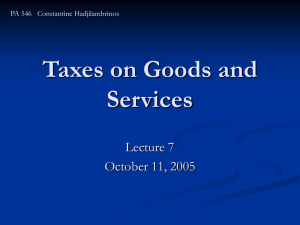Chapters 1-6: Searching for an Idea
advertisement
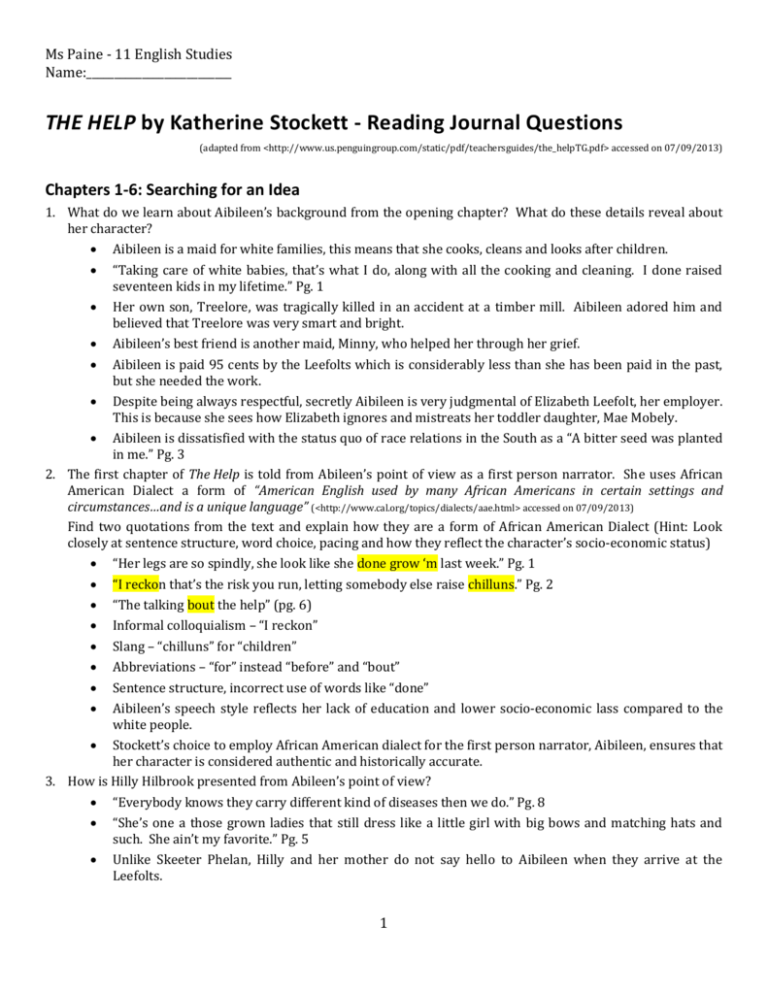
Ms Paine - 11 English Studies Name:__________________________ THE HELP by Katherine Stockett - Reading Journal Questions (adapted from <http://www.us.penguingroup.com/static/pdf/teachersguides/the_helpTG.pdf> accessed on 07/09/2013) Chapters 1-6: Searching for an Idea 1. What do we learn about Aibileen’s background from the opening chapter? What do these details reveal about her character? Aibileen is a maid for white families, this means that she cooks, cleans and looks after children. “Taking care of white babies, that’s what I do, along with all the cooking and cleaning. I done raised seventeen kids in my lifetime.” Pg. 1 Her own son, Treelore, was tragically killed in an accident at a timber mill. Aibileen adored him and believed that Treelore was very smart and bright. Aibileen’s best friend is another maid, Minny, who helped her through her grief. Aibileen is paid 95 cents by the Leefolts which is considerably less than she has been paid in the past, but she needed the work. Despite being always respectful, secretly Aibileen is very judgmental of Elizabeth Leefolt, her employer. This is because she sees how Elizabeth ignores and mistreats her toddler daughter, Mae Mobely. Aibileen is dissatisfied with the status quo of race relations in the South as a “A bitter seed was planted in me.” Pg. 3 2. The first chapter of The Help is told from Abileen’s point of view as a first person narrator. She uses African American Dialect a form of “American English used by many African Americans in certain settings and circumstances…and is a unique language” (<http://www.cal.org/topics/dialects/aae.html> accessed on 07/09/2013) Find two quotations from the text and explain how they are a form of African American Dialect (Hint: Look closely at sentence structure, word choice, pacing and how they reflect the character’s socio-economic status) “Her legs are so spindly, she look like she done grow ‘m last week.” Pg. 1 “I reckon that’s the risk you run, letting somebody else raise chilluns.” Pg. 2 “The talking bout the help” (pg. 6) Informal colloquialism – “I reckon” Slang – “chilluns” for “children” Abbreviations – “for” instead “before” and “bout” Sentence structure, incorrect use of words like “done” Aibileen’s speech style reflects her lack of education and lower socio-economic lass compared to the white people. Stockett’s choice to employ African American dialect for the first person narrator, Aibileen, ensures that her character is considered authentic and historically accurate. 3. How is Hilly Hilbrook presented from Abileen’s point of view? “Everybody knows they carry different kind of diseases then we do.” Pg. 8 “She’s one a those grown ladies that still dress like a little girl with big bows and matching hats and such. She ain’t my favorite.” Pg. 5 Unlike Skeeter Phelan, Hilly and her mother do not say hello to Aibileen when they arrive at the Leefolts. 1 When Aibileen is serving out the eggs, Hilly takes two to begin with and then grabs another two once Aibileen has finished serving the other women. This implies that she is quite greedy. (pg. 6) Hilly doesn’t thank Aibileen as she serves the food. Aibileen presents Hilly as the leader of the other girls – Skeeter and Elizabeth – as she leads the conversation, and threatens Skeeter with expulsion from the league if she doesn’t support her. 4. Why has Hilly designed the Home Help Sanitation Initiative? Hilly believes that colored people carry “different diseases” from white people, and therefore the help need their own separate bathroom. She has designed the Home Help Sanitation Initiative as a “disease preventative measure.” 5. How does Skeeter’s treatment of Abileen differ from the other white women? What does this reveal about her character? When Skeeter arrives at the LeFoolts, she greets Aibileen as “she the kind that speaks to the help.” Pg 4 According to Aibileen, Skeeter appears awkward as though she has been told what to wear by her mother. Skeeter is also the only one to thank Aibileen when she is serving the food. Skeeter is the only one to see the ridiculousness of Hilly’s Home Help Sanitation Intiative and is willing to argue with Hilly about it. While talking to Aibileen in the kitchen, Skeeter identifies the radio show she is listening too, “Preacher Green” (pg. 10), which reveals some interest and knowledge of black culture. Skeeter asks Aibileen directly, “Do you ever wish you could…change things? (pg. 10) Unlike the other white women, Skeeter is presented as being unusual and someone who treats the help as though they are real people rather than invisible helps, and that she wants to change and challenge the norms in Mississipi at this time. 6. How does “the colored part a town” (p.15) differ from the rest of Jackson, Mississippi? What are some of the forces that contribute to the segregation that arises in cities? Aibileen describes the “colored part of town” as “one big ant hill” as it is crowded compared to the white part of the city, and there is nowhere for black people to move too. Forces that contribute to segregation besides local laws include: poverty and low wages, availability of rentals, prejudice and racism 7. Like Abileen, Minny is also a first-person narrator who uses African American Dialect. What features does her voice have in common with Abileen? Find two quotations and analyze them in terms of sentence structure, and word choice. How does Stockett clearly differentiate Minny’s voice from Abileen’s? Minny and Aibileen both use slang and colloquialism like “chilluns” for children and “I ain’t” Unlike Aibileen, Minny’s interior monologue contains much more evidence of self reflection as she is aware that she is prone to answering back to her employers. Eg. “Don’t you go sassing this white lady like you done the other.” (pg. 31) 8. How does Stockett show the reader through Minny’s eyes why Miss Celia is so different from the other white women in the club? Look closely at the details Stockett gives the reader, and find at least two quotations. “Nice ladies don’t go around bare foot” (pg. 31) “Sugar Ditch is as low as you can go in Mississippi” pg 33 “ ‘Can I get you a cool drink?’ she asks. ‘Sit down and I’ll bring you something.’/ And that’s my clue something funny is going on here.” Pg. 31 Unlike the other white women in Jackson, Celia attempts to treat Minny as an equal. This is because of her own impoverished background, which meant that she has no experience with servants. Celia is also marginalized like Minny and the other black people, because she comes from “Sugar Ditch” and is ignored by the other white women in Jackson and is isolated on her husband’s property. 2 9. In Chapter 5, Stockett introduces the third first person narrator, Skeeter Phelan. How is her narration style different from Abileen and Minny? Find at least two quotations. What language techniques differentiate it from the other characters? How do these elements reflect her education and social status? Skeeter is well-educated and has been to college. She lives on a cotton plantation outside of Jackson. Skeeter aspires to be a writer, unlike Hilly and Elizabeth who are only focused on being wives and mothers. Skeeter physically stands out compared to the other women, as she is much taller and has curly red hair “Mrs Charlotte Phelan’s guide to Husband hunting, Rule Number One: a pretty, petite girl should accentuate with makeup and good posture. A tall, plain one with a trust fund.” (pg. 57) Skeeter’s choice of words in this quotation reflect her education level as she uses terms like “petite”, “accentuate” and “posture”. Stockett deliberately emphasizes Skeeter’s appearance to differentiate her from Hilly and Elizabeth. All part of the characterization of Skeeter. 10. In what ways has Constantine helped Skeeter to grow up? How has Constantine taught Skeeter kindness and self-respect? Constantine is the Phelan’s maid who raised Skeeter. Skeeter has a tense and uncomfortable relationship with her own mother, Charlotte, who is constantly critical of her aspirations and appearance. In contrast, Constantine is supportive of Skeeter and is someone she can confide in. Constantine tells Skeeter to ask herself “Am I gone believe what them fools say about me today?” pg. 63 Constantine uses positive reinforcement by telling Skeeter that she is going to be a “brain surgeon” Constantine teaches Skeeter that she should treat people how she would want to be treated herself, despite their color. The relationship between Skeeter and Constantine, is used by Stockett as a deliberate parallel to Aibileen’s relationship with Mae Mobely. Chapters 7-28: Writing the Stories 11. For Abileen to agree to help Skeeter with the book of The Help, what must Skeeter symbolically do? What is symbolic about Skeeter sitting in Abileen’s kitchen? 12. How does Aibileen try to counteract the negative effects of Elizabeth’s criticism and coldness to Mae Mobley? 13. Why is it ironic that Minny is so troubled by Miss Celia’s apparent lack of racism? What does it reveal about both of their characters? 14. In Chapters 22-23, what key events in the history of American Civil Rights occur? How do these affect the characters in the text? 15. Gretchen accuses Skeeter of being “Another white lady trying to make a dollar off of colored people” (p. 304). Is this what Skeeter is trying to do? If not, what is motivating her to collect and publish the maids’ stories? Is it personal ambition or something more worthy? 16. Toilets as a symbol in The Help. a) Why does Aibileen say thank you to Hilly for the outside toilet when she feels so demeaned by it? b) Why is Louvenia’s grandson, Robert, attacked? c) How are the Jim Crow Laws that Skeeter discovers in the library similar to Hilly’s bathroom plan. Why does Elizabeth spank Mae Moberly for using the maid’s bathroom? d) Why does Skeeter betray Hilly and tell people to dump their old toilets on the Holbrook’s front lawn? e) What is Abileen’s reaction to the dumping of toilets on the Holbrook’s front lawn? f) What is unique about toilets as opposed to other rooms in a house where a black maid serves a white family? g) What do the toilets act as a symbol for in the novel? 3 17. What does the incident with the prowler who harasses Minny and Celia reveal about the personalities of these two women? 18. Yule May is a minor but significant character. What is unique about her background compared to the other maids? What does her character represent in The Help? 19. The typeface in Chapter 25 “The Benefit” is bordered by vertical lines on both sides. What is different about the narration of this chapter that sets it off from the rest of the novel? Why has Stockett chosen to differentiate it so much from the other sections? 20. What is ironic about the proceeds from the Benefit going to the “Poor Starving Children of Africa” (p. 377)? What does it reveal about Hilly’s character and those who support her? 21. Why does Minny risk her job and explain to Celia the story behind Hilly and the chocolate pie? Is Minny justified in doing the “terrible awful” thing to get even with Hilly for lying about her? How does this act reflect the power relations between the two people? How does it compare to Skeeter’s having the toilets sent to Hilly’s lawn? 22. What does Celia’s chopping down the mimosa tree outside her kitchen window signify? 23. How is Hilly Holbrook characterized as a villain throughout this section of the book? Not just by the black maids, but also in her relationship with Skeeter, Elizabeth and Celia Foote? Chapters 28-34: Aftermath 24. Why does Stuart withdraw his proposal of marriage to Skeeter? Why is he unable to appreciate what Skeeter has done? 25. What does Skeeter find out about why Constantine left? Why is this significant? 26. After realizing the desperation felt by Lou Anne, Skeeter reflects that the point of the book was: “For women to realize, We are just two people. Not that much separates us. Not nearly as much as I’d thought” (p. 492). In what way is this idea revealed in the book edited by Skeeter? 27. Consider the title of The Help. What are some of its literal and figurative meanings in regards to the novel? Do you think this is a good choice of title? Why or why not? 4
